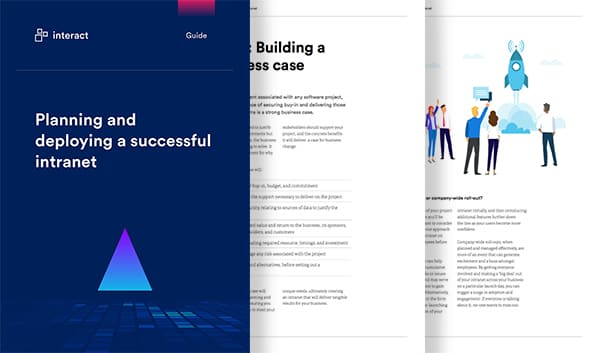12 top tips for integrating a non-native speaker into your organization

Cedric Le Guerson joined Interact in May 2017, just 6 months after moving to the UK from his hometown of Ploulec’h in France.
Beginning his role as a Marketing Administrator, Cedric initially had limited hands-on experience using his English: but rapidly matured his fluency and integrated into the business. Now a Data Analyst in the Marketing team, Cedric offers his experiences as a multilingual employee for other organizations looking to bring non-native speakers onboard.

Impact on your organization
Today we have a more significant migration and movement of the population, and a lot of governmental programs have been created to support this. For example, the installation of Erasmus (European student program exchange) and Schengen (EU agreement which allows people and goods to pass freely across the borders of each country without a passport or other controls), which allow any European to live wherever they want with no political restriction.

Since the introduction of Erasmus, the programme has been used by more than 4 million students across all of Europe. This shows the willingness of citizens to travel and learn a new culture.
Because of this, it’s more than likely you will have a non-native speaker in your organization. These individuals could be a real advantage for your organization, as they could help you expand into the international market. However, this can come with challenges.
In small and medium organizations, the consequences of having a non-native speaker tend to have a more significant impact. For those organizations, it’s essential to have a strategic communication plan specific for multilinguistic employees. This plan could take different approaches for recruitment and after onboarding.
Every organization needs to build an international environment, from the small coffee shop in the corner, which needs to have the menu in a different language, to the bigger office which needs to trade internationally and communicate with potential customers. Depending on the origin of the country, between 4% (Ireland) to 84% (Lithuania) of the organizations interviewed needed to use a translator or interpreter for their business.
For those small or medium organizations using an external translator, there could be a massive impact on finances.
However, the impact could also be detrimental if they are not investing in translation: 11% of organizations that don’t have translation services have lost at least one sales opportunity because of the language barrier. The loss could be a result of not having a product or service available in a different language (for example, a menu in the restaurant not available in French) or a lack of the communications to promote this service (for example, the website is not available in Spanish, but the service is available in this language).
Some organizations have created a strategic plan for international communication by implementing a strategy for recruitment to look for multilingual staff, using a translator more frequently, and having their service available in a multitude of languages. This could have a positive impact by increasing sales by 44%. All of these actions are a result of investment to improve your visibility internationally.
Integrating non-native speakers in your organization

We are recruiting non-native speakers more often, and this could have a positive impact on your organization.
But because this new starter will not necessarily be fully multilingual, it’s essential to take some action to facilitate her/his integration. Here, we have some tips based on what we do at Interact to help you to integrate your multilingual staff:
#1. Interview: we have realized a phone interview is not always the best practice as a non-native speaker could have difficulty understanding and following a professional conversation. If all exchange we have with a potential candidate is confirmed by email, it’s possible for them to use a translator to make sure all information has been clearly understood.
#2. Job agreement: at Interact we have our job agreements available in different languages, as it’s essential for a new speaker to clearly understood what the legislation is in our country. This may be different from their own. If we don’t have a translation in their language, we also take time to make sure the entire contract has been understood.
#3. First week lunch: In the first week of employment, we organize a lunch for the new employee with their line manager. This helps to catch any difficulty or apprehension the new starter could have. This lunch will be outside the office in a neutral environment and creates a trusting relationship, showing the door is always open and it’s possible to speak without any worries to their manager.
#4. Connect to the right person: we also notify the new starter who the best person is to speak to regarding any issue they could have; for example, who is the best person to contact in case of tax issues or HR processes.
#5. Challenge: we challenge our new starters to improve their reading or speaking. Depending on the expectation and department, we set some work goals with the objective to improve those skills. Those goals will be related to work. This could be, for example, write a report each week.
#6. English lessons: depending on the level of the new starter, we may organize some English lessons. These English lessons can be during lunchtime or during work time depending on expectation and may be external to the organization or internal if the resource is available.
#7. Grammarly: it’s important to help your non-native speakers on a day-to-day basis and because it’s not always possible to have someone to correct and verify each piece of writing, Grammarly can help non-native speakers to improve their writing skills and correct any mistakes they could make.
#8. Not have staff who speak the same language working together: we make sure people with the same native language are not working together, as this will be not the best practice to improve language skills. But we make sure it’s easy for the new starter to know who can help in any language. On work profiles on the intranet, staff can add any language they speak.
#9. Group speaking: we organize a group speaking session for foreign people. Wherever staff come from, this will help them to talk about their concerns openly. When they arrive in a new country or organization, it is always helpful to talk about differences and difficulties they could have. It’s also helpful to have some conversation across a multitude of departments and meet people who have experienced the same situation.
#10. Language integration: we use a multitude of different software programs every day but most of them will already offer the native language without needing to change settings. For example, your Google account recognizes your native language and automatically redirects you to your native language. We also set our internal communication software to the language our employee wants or needs.

#11. Keep track: every couple of months, follow up with your non-native speakers to check if everything is going ok.
#12. Translation: we have translation functionality integrated into our internal communication software, which could be used on a daily basis for any HR documents, company updates, or blogs, and available in all the languages needed.
Integrating a non-native speaker is about more than just language
A multitude of actions could be taken to help onboard a non-native speaker, and these actions will depend on your organization and your needs. The more time you spend creating and improving your non-native integration plan, the more likely your new starters will have a friendly experience and will be beneficial for your organization.
Having a multitude of different speakers will help for example in retail, if you need to speak with an international customer, or in an office to translate an inquiry. For me personally, I’ve needed to quickly translate an email from some of our Canadian customers, saving time for our company.
You will realize you have more than just an employee who can speak another language and help your organization with translation. You will gain a culture.

Here at Interact, we have celebrated the French National day, and it was an enrichment to all our employees to learn more about a different culture and custom. Some other colleagues have made Greek cake during our charity day or blogged about religious festivals from their culture.
It also improves internal communication, as it will encourage employees to talk to each other who usually don’t because they are in different departments. Having a multitude of different cultures or views can bring another way to look at your business, bring you some new ideas and another way to think.
|
.png)
